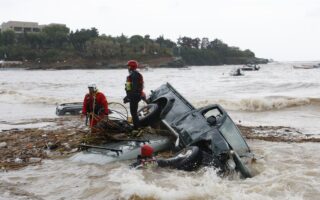Greece embraces UN resolution for climate justice

A daring idea, the brain child of a group of law students in Port Vila, the capital of Vanuatu, an island country in the South Pacific, back in 2019, finally resulted in the adoption of a monumental resolution by consensus. Having led the way, Vanuatu, alongside a group of 18 “Champions Nations” from around the world, created the necessary conditions to seek an International Court of Justice Advisory Opinion (ICJAO) on states’ obligations to protect the climate system under international law.
To reach the successful outcome of March 29, Vanuatu had to initiate a two-year campaign with diverse diplomatic activities in order to ensure the support of the United Nations General Assembly. However, the Vanuatu government’s ICJAO campaign would have not been the same without the crucial action and support of the Pacific Island Students Fighting Climate Change (PISFCC) and the World’s Youth for Climate Justice (WYCJ).
All mobilization and awareness endeavors had been recognized by the international community. A few weeks ago, 105 UN member-states, Greece included, co-sponsored the resolution. Such participation already portended a positive result. Ultimately, the adoption of the resolution was co-sponsored by more than 130 states.
So why did Greece support Vanuatu’s draft resolution?
Although Greece belongs to the club of developed countries, the climate crisis does not seem to be interested in such human concepts. Besides, Greece’s geographic location is in the Mediterranean, which is a “vulnerability hotspot” – inevitably, the effects of climate change are expected to be particularly intense in this region.
Moreover, over the last few decades, numerous natural disasters have taken place on a large scale in Southern Europe as a result of climate change, with the most characteristic example in Greece being the devastating wildfires in the summer of 2021. Moreover, considering the concerning projections of the International Panel on Climate Change (IPCC) and as long as the Paris Agreement temperature goals remain far from being met, the climatic conditions will get worse.
Global problems always require global solutions. In the context of international partnership, the adoption of both the Paris Agreement and the 2030 Agenda for Sustainable Development, with its 17 Sustainable Development Goals (SDGs), set the global strategy for climate action. At a European level, the European Green Deal has established the European Climate Law and the European Climate Pact for reaching the ambitious long-term binding objective of a climate-neutral EU by 2050. Similarly, the ambitious intermediate Climate Target Plan, with the aim of reducing net greenhouse gas emissions by at least 55% by 2030, compared to 1990 levels, has also been set.
The effects of climate change are expected to be particularly intense in the Mediterranean region
Greece has implemented several measures so as to harmonize with European and international imperatives. The National Strategy for Adaptation to Climate Change, the National Energy and Climate Plan, the Just Development Transition Plan, the passing of the first national climate law 4396/2022 and the National Recovery and Resilience Plan, “Greece 2.0,” comprise a series of legislative acts in the right direction.
The admittedly delayed de-lignitization has brought a shift toward renewable energy sources for green and sustainable development (luckily, Greece enjoys an abundance of sunshine and wind). Even at the level of public dialogue, the will for a green transition is evident. More and more parties are putting climate change, the protection of natural ecosystems and biodiversity preservation on their agendas, municipalities are proceeding with energy efficiency upgrades for buildings, and public institutions such as the Hellenic Foundation for European and Foreign Policy (ELIAMEP) are offering training courses with respect to climate change (e.g. ARSINOE). Therefore, to avoid the unpleasant situations of the past, Greece has made significant progress by taking initiatives to tackle climate change.
Greece itself will benefit from the International Court of Justice Advisory Opinion.
On April 17, 2023, the request for an advisory opinion was addressed to the ICJ’s registrar by the United Nations secretary-general. Taking for granted that all procedural requirements will be met by the ICJ, written and oral proceedings will commence. Although the core group will have an immediate interest, Greece is also entitled to submit a written statement, or to comment on a written statement submitted by another state in order to provide additional information on the question.
Regardless of the non-binding nature of advisory opinions, past attempts have proved that they carry legal weight and moral authority. An advisory opinion from the ICJ can also shape international law by clarifying the vague provisions of the Paris Agreement and the United Nations Framework Convention on Climate Change (UNFCCC), as well as by interpreting human rights law treaties in the climate context. It can also accelerate ongoing climate change negotiations and be a cornerstone for climate litigation in the future. Even domestically, it may be of great influence for individuals or environmental groups to file a lawsuit in Greek courts against private companies for contributing to climate harm.
If it is consolidated universally that climate change comprises a “common concern of humankind” requiring global cooperation and coordination, such an opinion will open an avenue for climate justice. Hence, Greece should steadily support similar international initiatives and stand on the side of every nation that is disproportionately affected by climate change.
Nikolaos Karampatzos is a lawyer in Greece (member of the Piraeus Bar Association) and a PhD candidate at the National and Kapodistrian University of Athens’ School of Law. His research topic is “Climate Change Implications on the Oceans: The Adaptation of Legal Approaches in Light of the United Nations Convention on the Law of the Sea and International Law.”





